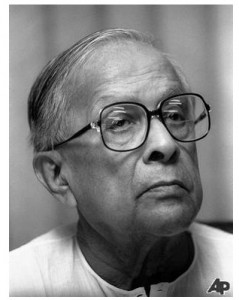 When Jyoti Basu, 95, the Marxist leader from West Bengal, died in January 2010, obituaries in leading English dailies — The Hindu, Hindustan Times, and Times of India and others — called him a colossus, a towering personality, pragmatist with a managerial style, and the prime minister India never had. UK’s Guardian admired his “tempered pragmatism.â€
When Jyoti Basu, 95, the Marxist leader from West Bengal, died in January 2010, obituaries in leading English dailies — The Hindu, Hindustan Times, and Times of India and others — called him a colossus, a towering personality, pragmatist with a managerial style, and the prime minister India never had. UK’s Guardian admired his “tempered pragmatism.â€
While the leading English dailies were praising him to the skies, they were rather muted in Basu’s failings. Hindustan Times’s writing was typical: “His tenure as chief minister was not without allegations of corruption, especially against his industrialist son. But these remained just allegations. While the agrarian reforms in West Bengal were hailed as a model across the country, Basu was widely faulted for his poor showing in various other sectors including industry, education and health.â€
Basu was West Bengal’s chief minister for 23 continuous years, a record unmatched in India, till he relinquished the job several years ago on account of senility.
While the Indian Media was praising Basu to the sky, the blogosphere and the comments underneath the obits were brutal in criticizing Jyoti Basu: “Jyoti Basu made West Bengal Waste Bengal,†“He died 30 years too late,†and “Thank god he did not become India’s prime minister. He would have made the whole of India a waste land.â€
It should be noted that in the period after India’s Independence in 1947, Calcutta (Kolkata now) and West Bengal were models for others to emulate in India. So, people participating in the blogosphere could be biased. Mostly they are the Bengali intelligentsia, its Bhadralok. Basu himself was paradoxically a Bhadralok, son of a doctor, and himself a barrister from England.
To have access to high-speed internet in India, you need to have some level of education and access to resources. So, I was looking for more objective measures on where West Bengal stands today, after over 30 years of proletarian Marxist rule with the “pragmatic manager†Jyoti Basu at the helm.
Here are the observations of Praful Bidwai, a Delhi-based peace activist and a left-of-center writer. Bidwai’s article under the caption “Jyoti Basu’s Mixed Legacy†was published on January 23, 2010 in the The international News www.thenews.com.pk).
- ˜ The percentage of rural households in India not getting enough food every day in some months of the year is highest in West Bengal (10.6%), worse than even Orissa (4.8%), perhaps India’s poorest state.
- West Bengal has more than 900,600 school dropouts in the 6-14 age group, higher than Bihar’s nearly 700,000.
- Of India’s 24 districts which have more than 50,000 out-of-school children, nine are in West Bengal.
- According to India’s Human Development Report (2004), in West Bengal, spending on, and access to, health services stagnated.
- Antenatal care, women’s nutrition, and doctors and hospital beds per 100,000 people in West Bengal are below national average.
- West Bengal hasn’t opened a new primary health centre in a decade.
- India’s worst recent food riots occurred in West Bengal when starving people raided the stores of corrupt ration-shop owners, all CPM members.
- Meanwhile, some of the gains of Basu-initiated land reforms have eroded: 17% of registered tenants have lost their land and another 27 percent are vulnerable.
- Under Basu’s Marxist rule, quality of higher education for which Bengal was famous, nosedived.
- Under Basu’s reign, his party cadres permeated all state bureaucracy and held sway, and he could not control or discipline them for their wayward behavior.
This is his “mixed†legacy. Even though this assessment will not be endorsed by all, a large section of educated Indians, and Bengalis in particular, believe that he was responsible for bringing down West Bengal to its knees, something even the British colonial power could not do.
Basu’s Marxist rule caused flights of educated people, capital and industries to the other states and sapped Bengal of its vitality. These Bengalis are not going to return to Bengal anytime soon.
His son Chandan Basu became an industrialist in Bengal when the state was under Marxist rule with the Marxist Jyoti Basu at the helm. Chandan Basu’s high-HP imported SUVs were confiscated for nonpayment of import duties. So much for Marxist proletarian ideology.
Basu’s spiritual mentor, China’s Deng Xiaopeng, abandoned Marxist ideas on production and distribution of goods and services and embraced what is now called “totalitarian capitalism.†But Basu saw no reason to change his strategy. So much for being “pragmatic manager.â€
English dailies even made a virtue of Basu’s atheism implicitly attributing it to his Marxist ideology. But atheism is not something that Indians had to learn from Marx, if only the anglicized Indian writers and editors  take their time to know India’s own philosophical traditions.
Marxist believe that in their Utopia, “state would wither away.â€Â In Basu’s Bengal, on many important measures the state indeed withered away. But the Marxists’ classless Utopia was nowhere in sight.   —  By Kollengode S. Venkataraman
